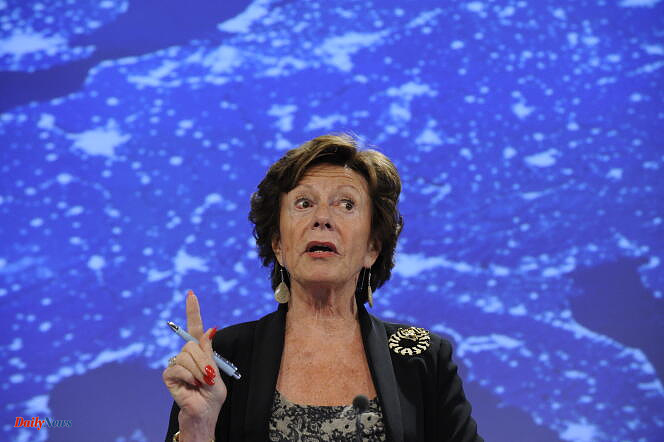The report's conclusion is unambiguous: it was not possible to prove that former European Commissioner Neelie Kroes broke the rules by joining Uber in 2016. This fourteen-page report from the European Anti-Fraud Office (OLAF), a partly redacted version of which was published by Politico and Follow the Money on March 7, however, shows just as clearly that the investigation did not really shed light on the situation.
OLAF's investigations were triggered by the revelations of the "Uber Files", thousands of documents sent by former Uber lobbyist Mark MacGann to the Guardian, who dissected them with forty-two partner media, including Le Monde . This investigation, published in July 2022, recounted how the chauffeur-driven car (VTC) platform approached Dutchwoman Neelie Kroes with a view to recruiting her in the summer of 2014, when she was still vice-president of the European Commission, responsible for digital affairs. The investigation also revealed how Ms. Kroes intervened in favor of Uber on several occasions thereafter, before being officially enrolled in the “public policy advisory committee” of the American company on May 3, 2016.
The maneuvers of the group founded by Travis Kalanick raised questions for several reasons. First, it is in principle prohibited for any European commissioner to initiate discussions during his mandate with a view to future private employment. Then, former European officials retain certain duties in terms of ethics and transparency after the end of their functions, in particular during the two years which follow them (eighteen months at the time when Neelie Kroes was commissioner) . It is also in return for these constraints that former European commissioners can benefit from compensation, which can represent up to 65% of their former salary during this “cooling-off period”.
Uber’s “selective” cooperation
To try to find out whether Ms Kroes had failed in her obligations, OLAF investigators knocked on several doors, but their work quickly turned into a fiasco. They thus deplore not having been able to speak with the whistleblower Mark MacGann, at the origin of the “Uber Files”, who simply sent them certain documents and written responses. They were also unable to get their hands on the electronic data tracing the activities of the European Commissioner until the end of her mandate in October 2014, because the European Commission no longer has it in its possession.
As for Uber, the company “expressed its desire to cooperate with OLAF”, but said it could only provide little information, due to the age of the facts. If the company communicated certain documents to investigators, the latter's report deplores a "selective" transparency, which hampered their research. Same attitude from another key protagonist in the case: Sebastian Vos. It’s this public affairs manager from the Covington firm
Due to a lack of convincing evidence, OLAF therefore had little to oppose to Neelie Kroes' line of defense. The former European manager has, of course, confirmed that she was approached by Uber before the end of her mandate, but she claims to have responded on several occasions to the company that she was not in a position to negotiate in more detail her possible hired while she was in office.
A revolving door negotiated upstream
The “Uber Files,” however, tell a completely different story. The documents show that the former leader did not refuse these negotiations: above all, she did everything to conceal them. On September 7, 2014, lobbyist Sebastian Vos reported that he had just had a “good follow-up conversation” with Neelie Kroes, who “is willing to explore the possibilities of joining our advisory committee.”
At the same time, the commissioner's office asked Uber to have its manager, Travis Kalanick, speak at an event he was organizing. But Neelie Kroes asks the company to decline this invitation. She “will join our (mega confidential) advisory committee” and cannot afford to appear with her future employer during her last weeks in office, insists Mark MacGann, the platform's chief lobbyist in Europe, in an internal exchange. “Her office IS NOT AWARE of our direct conversations with her,” he insists in another message.
Behind the scenes, discussions continue between the platform and the European manager. At the end of September, Uber sent him a document detailing the role offered to him and the planned compensation. The Dutchwoman meets Sebastian Vos again on October 18, just before leaving her role as commissioner. She saw him again on November 18, with Mark MacGann.
It is extremely rare to have such detailed information concerning the conditions under which a private company approaches a public manager. Questioned on the subject in July 2022, a spokesperson for the European Commission acknowledged that “it is obvious that contacts with a view to a potential new activity during the mandate are sensitive and require very careful treatment in order to avoid any perceived or actual conflict of interest.” The aftermath of the Neelie Kroes case, however, shows that Brussels is still struggling to enforce its own rules in this area.












